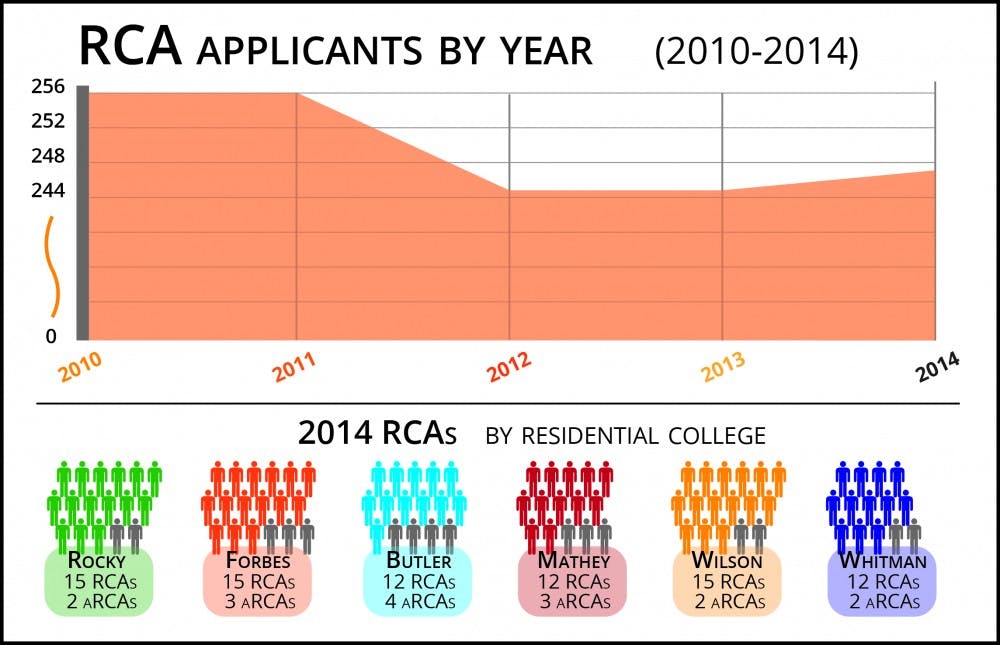Approximately 40 percent of student applicants for the position of residential college adviser were offered a position this year, Associate Dean of the Office of the Dean of Undergraduate Students Michael Olin said.
Olin noted that there will be 99 RCAs and assistant residential college advisers next year, including 52 new advisers and 47 returning advisers. Two hundred forty-seven students applied for the position this year, a slightly higher number than the 245 who applied last year.
Although the overall acceptance rate for RCAs was around 40 percent, the acceptance rate for non-returning RCAs was closer to 25 percent. Out of 200 new RCAs who applied, 52 were accepted.
The remaining students were waitlisted or rejected depending on the individual choices of the residential college staff members.
According to Olin, Butler College accepted 12 RCAs and four ARCAs,Forbes College accepted 15 RCAs and three ARCAs, Mathey College accepted 12 RCAs and three ARCAs,Rockefeller College accepted 15 RCAs and two ARCAs, Whitman College accepted 12 RCAs and two ARCAs and Wilson College accepted 15 RCAs and two ARCAs.
Although the University originally anticipated 51 acceptances, Wilson College decided to hire an additional ARCA, increasing the number to 52, Olin said.
While ARCAs are not assigned to a specific advisee group, they aid RCAs with different types of programming and would potentially replace any RCAs who have to leave the position, Olin explained.

Olin said that the position of RCA is a demanding one, requiring individuals who succeed both as individuals and as community-builders. He added that especially given the gravity of the discussions that occur at the beginning of each year between RCAs and their ’zees, one of the most prominent qualities in an ideal RCA is a willingness to put himself out there.
“They’re charged with some pretty serious conversations about alcohol, sexual assault, other important issues on our campus,” Olin said. “They have to be able to shift from facilitating a very serious conversation to being able to run a very fun scavenger hunt, and it’s a transition that not everyone can make.”
Olin noted that because the RCA position is so unique, the RCA selection process requires multiple tools, including an application and interviews, to gauge the success of applicants.
The process itself started with the submission of an online application during November of last year. The application consisted of basic personal information, several standard essay questions and two letters of recommendation. After an initial screening, some students were asked for an interview.

The interview selection process depended on standards similar to those of job selections, such as past academic performance, involvement in extracurricular activities and commitment and dedication to the position of RCA, among other criteria, according to Emily Adler ’16, who will serve as an RCA in Mathey College next year. She said that the selection process was overall a positive experience.
“I definitely felt supported,” Adler said of the application process. “The thing is, you work so much with your RCA core group, where the RCAs get together and talk about issues, so you want your friends to also get the position because you’d be working with them. It was a really supportive process.”
Olin works with the directors of student life each year to set up the application and the timeline for the application process. The application deadline was moved one week earlier than usual this year in order to give more time for residential colleges to review the materials, Olin said. He is not involved in the interview process, however, leaving that up to the residential colleges themselves.
“Princeton students are solid to begin with and so the applicant pool is usually very strong,” Olin said, adding that the administration is spoiled with the impressive quality of the applicant pools. “It was definitely the case this year. It is unfortunate that there is a limited number of positions, and the colleges are definitely having to turn away applicants who would succeed as RCAs.”
While RCA applicants have various motivations, Adler recalled that she wanted to be an RCA because of how amazing her RCA had made her first year at the University.
“My best friends are from freshman year. My RCA really brought together our ’zee group,” Adler said, adding that she is lookingto the year aheadwith excitement. “I didn’t grow up with little siblings —I’m the youngest —so it’s really fun playing the role of a big sister.”
While the position can be appealing because it is one of the most direct ways to mentor students, especially freshmen, Ross Donovan ’16, who will be an RCA in Butler College next year,said that it’s not the only way.
“My personal philosophy is that everything happens for a reason,” Donovan said. “Not getting an RCA position means that you might get to work with freshmen in a different capacity or maybe new opportunities will open up.”
Clarification: This article has been updated to reflect the fact that the overall acceptance rate of 40 percent for RCAs is different from the acceptance rate for new RCAs, which is closer to 25 percent.








